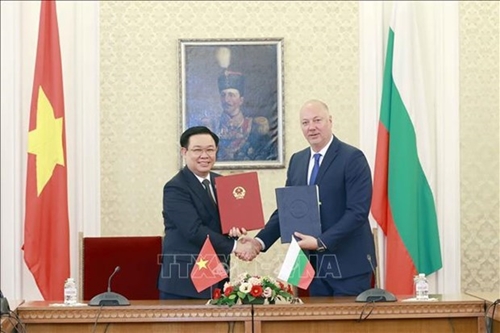At the talks, which took place following an official welcome ceremony for the Vietnamese top legislator, Zhelyazkov affirmed that Vuong Dinh Hue’s visit is of significance as it marks a new step in the relations between the two countries.
Zhelyazkov congratulated the great achievements Vietnam has recorded in reform, in which, he said, the Vietnamese legislature plays a crucial role.
    |
 |
|
N.A. Chairman Vuong Dinh Hue (left) and his Bulgarian counterpart Rosen Zhelyazkov sign a memorandum of understanding (MoU) on cooperation between the two legislatures following their talks in Sofia on September 25. |
Bulgaria always attaches importance to the long-standing friendship and multi-faceted cooperation with Vietnam, which have been cultivated by generations of leaders of the two countries over the past more than seven decades, he stressed.
For his part, Vuong Dinh Hue emphasized that the State, N.A. and people of Vietnam always remember the valuable, whole-hearted support of Bulgaria to Vietnam during its past struggle for national independence as well as the present cause of national construction and development.
Bulgaria was one of the first countries to recognise and establish diplomatic relations with Vietnam, and it has helped the Southeast Asian nation train over 30,000 officials and technicians, including many high-ranking officials, he continued.
Vuong Dinh Hue noted his belief that the visit will contribute to enhancing the bilateral cooperation intensively, practically and comprehensively across spheres.
The two leaders had an in-depth discussion on various issues, both bilaterally and multilaterally, and shared the view that the bilateral cooperation has been strengthened in different areas, yet it has not matched the political trust and potential of both sides.
Therefore, for politics and diplomacy, they agreed to step up the exchange of delegations at all levels, enhance collaboration between N.A. committees and agencies, and promote the legislatures’ role in supervision and the implementation of agreements reached by the two countries.
Vietnam and Bulgaria will also further coordinate and support each other at regional and international forums like the United Nations, the European Union (E.U.) and the Association of Southeast Asian Nations (ASEAN).
Vietnam supports the Bulgarian N.A. to consolidate and elevate its relations with the ASEAN Inter-Parliamentary Assembly (AIPA), Vuong Dinh Hue affirmed. Meanwhile, Zhelyazkov pledged to support Vietnam in cooperation areas with the E.U. and the European Parliament (E.P.).
Both leaders held that economic cooperation between Vietnam and Bulgaria has made progress over the past time, and noted their support for the implementation of documents signed bilaterally as well as within the E.U. framework to improve the trade balance and foster the economic ties.
They consented to soon organize the 24th meeting of the inter-governmental committee for economic, trade and scientific cooperation, create favorable conditions for products of the two countries to access the respective markets, expand cooperation in such fields as processing and manufacturing, high-tech, innovation, health care, pharmaceutical products, and especially economy and logistics.
Hue thanked the Bulgarian N.A. for its approval of the E.U. - Vietnam Investment Protection Agreement (EVIPA), which took place ahead of his visit, saying it will create a firm, favorable legal foundation for businesses of the two countries to expand their cooperation in the time ahead once the deal comes into force.
Zhelyazkov suggested the two sides bring into full play advantages generated by the EVIPA and consider establishing joint ventures in either Vietnam or Bulgaria to meet their demand or serve export to a third country.
The leaders shared the view that such traditional, potential cooperation spheres as education-training, labor, and tourism, and collaboration between localities should be promoted in the time ahead.
Vuong Dinh Hue used the occasion to call on the Bulgarian Government and N.A. to create more favorable conditions for nearly 1,000 Vietnamese to live and integrate in the host society.
They said the bilateral legislative ties are developing fruitfully, and concurred to maintain the exchange of delegations at the high level, as well as between specialized committees and friendship parliamentarians’ groups.
The two legislative bodies should intensify the exchange of information and experience, and continue their close coordination and mutual support at multilateral forums like the Inter-Parliamentary Union (IPU), and the Asia - Europe Parliamentary Partnership (ASEP), they suggested.
Vuong Dinh Hue said the Vietnamese N.A. advocates enhancing parliamentary diplomacy and forging bilateral legislative cooperation, while actively participating in regional and international forums.
Regarding regional and international issues, the two leaders stressed that all conflicts and disputes should be handled by peaceful measures in accordance with international law and the U.N. Charter.
Vuong Dinh Hue suggested Bulgaria continue its support for ASEAN’s centrality and stance on the East Sea (South China Sea).
Zhelyazkov said Bulgaria always keeps a close watch on and highly values Vietnam’s position in the region and ASEAN, as well as the Southeast Asian country’s foreign policy.
Both leaders expressed their belief that the talks will help consolidate the good political ties between Vietnam and Bulgaria, and upgrade their traditional friendship and cooperation.
On this occasion, Vuong Dinh Hue invited Zhelyazkov to visit Vietnam. The Bulgarian leader accepted the invitation with pleasure.
Following their talks, they signed a memorandum of understanding (MoU) on cooperation between the two legislatures, which takes effect from the date of signing and replaces the MoU inked on April 16, 2012.
They then witnessed the signing and handover of four cooperation documents, including one between the Vietnamese N.A. Office and the Bulgarian N.A. Secretariat, and the others covering cooperation in culture and tourism, and collaboration between Vietnam’s Vinh Phuc province, and Pernik province of Bulgaria.
Source: VNA